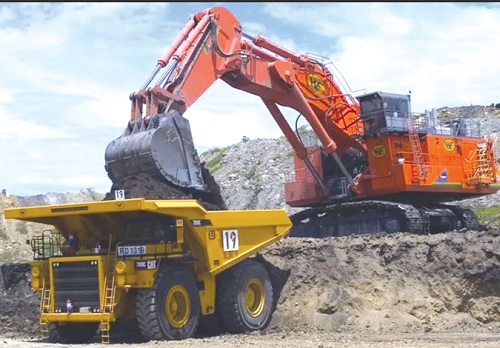Ghana's forests, the lifeblood of its ecosystems and communities, face existential threats from illegal mining or galamsey.
Genocide and ecocide are being committed in Ghana as we speak.
It did not stop with the elections.
There was just a change of buttons, just as the National Democratic Congress (NDC) took over the reins of power.
The criminals engaged in galamsey, who knowing their party is in power, have taken over from those whose party lost elections.
This scourge has ravaged our landscapes, poisoned water bodies, compromised biodiversity, killed our youth, and resulted in spontaneous abortions, malformed and deformed babies and a lot of stillbirths, demanding urgent action.
Yet, a legal and logistical quandary hinders frontline officers: How to neutralise mining equipment, especially excavators used illegally in remote forest reserves, when a seizure is impractical.
Empowering Forestry Commission officers to immobilise or destroy excavators as a last resort aligns with Ghana's laws, ecological imperatives, and moral duty to future generations.
Mandate, limitations
Under the Forest Protection Act, 1974, NRCD 243 (Section 4(1), forest officers are obligated to "take necessary steps to prevent offences", such as, illegal mining.
However, NRCD 243 Section 5.3 complicates enforcement, but says inter alia “a forest officer may seize.” It is not as definite as section 4.1, which says, “ shall take necessary steps to prevent”: Officers cannot legally seize if criminals immobilise equipment (e.g., removing control boards).
Leaving machinery in situ risks its reuse, rendering the officer complicit in perpetuating the crime through inaction. This contradiction creates a legal and ethical trap, undermining environmental protection efforts.
Necessity, lawful defense
When laws conflict, the principle, quod est necessarium est licitum (what is necessary is lawful) offers clarity.
Lawyer Kofi Bentil aptly notes that officers are legally required to act decisively to prevent further harm when conventional methods fail.
If removing excavators via low loaders is unfeasible—due to cost, corruption, or logistical barriers—immobilising them through removing crucial and not-easy-to-replace parts, become necessary!
Where that is not feasible, it is arguable that burning, salting engines, or dismantling critical components becomes a proportional response.
He further asks, “how else should the under equipped forest officers immobilise these massive machines?”
While drastic, these measures align with the Forest Protection Act’s intent: prioritising prevention over procedural rigidity. When faced with a serious problem (which galamsey undoubtedly is, officers must step up and apply effective measures to rein in the criminals; and if they have to go to the brink of law to be effective, that is justifiable under the doctrine of necessity, and signals to the proposition that the laws are archaic, and unfit for purpose.
Too much has been said in defence of miners and their equipment and too little in defence of the officers and the effective performance of their duties.
It is not right to raise restrictions and defences which always work for the criminals, that is part of the reason why we have so far not made progress with the fight against galamsey.
When confronted with people who are prepared to kill and die in the pursuit of their criminal quests, we cannot pretend things are normal and will work as intended.
Clearly, the existing laws are inadequate, there is sufficient reason to immobilise excavators effectively, even if it means burning them.
Counterarguments
Critics may decry property destruction or due process concerns. Yet, the survival of Ghana’s forests transcends individual property rights. Illegal miners forfeit legal protections by operating outside the law.
Moreover, alternatives like confiscation often fail; countless excavators vanish from state custody, recycled back into crime.
With my knowledge in IT Law, I posit that the prosecution can still proceed using Vehicle Identification Numbers (VINs) and photographic evidence.
Pragmatism, legal reform
• Last-resort immobilisation: Permit officers to disable equipment only within forest reserves when removal is impossible. This narrow scope ensures proportionality.
• Resource Investment: Equip officers with radios, low loaders, and funding for swift removal where feasible, reducing reliance on destructive measures.
• Legal harmonisation: The Attorney General and Chief Justice must clarify protocols for evidence collection (e.g., documenting VINs) and endorse immobilisation as lawful under exigent circumstances.
• Anti-corruption safeguards: Audit confiscated equipment and prosecute officials complicit in “missing" machinery. The audit includes all the excavators confiscated by the past regime.
Survival over status quo
President John Mahama’s directive against burning excavators, while well-intentioned, overlooks ground realities. Ghana’s environmental existential threat and crisis demands pragmatism.
Forest officers must act decisively to disrupt galamsey networks, even if temporarily disabling machinery. As Kofi Bentil asserts, necessity legitimises action, when aligned with the public good.
Legal reforms should follow, but immediate survival cannot wait. Let Ghana err on the side of life—its forests, waters, and people—by empowering officers to act when all else fails.
The cost of inaction is irrevocable; the cost of a replaced engine is negligible.
The nuclear state, though they have not used their nuclear armaments after Hiroshima and Nagasaki, they retain them as weapons of last resort and deterrence.
So the Forestry Commission should have the option of burning excavators found in forest reserves as a matter of last resort to deter these criminals who import, sell or rent out these weapons of mass destruction.
To the President, please revisit this directive.
To Parliament: Legislate clarity. To citizens: Your demand for accountability is crucial.
Ghana's future hinges on protecting its natural heritage today.
The writer is the CEO of the Ghana Chamber of Telecommunication.

